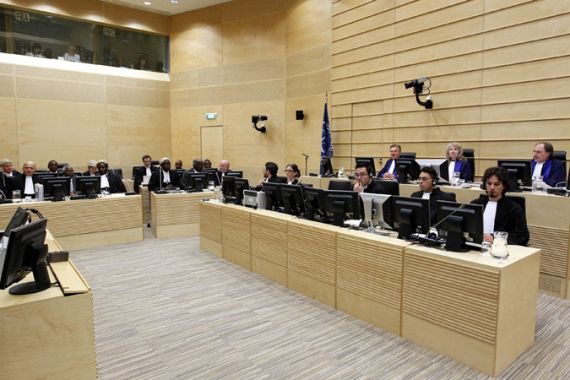ICC to try four Kenyans over 2007 violence
Court at The Hague rejects appeal of leading politicians charged with orchestrating post-election violence in 2007.

Four prominent Kenyans accused of being involved in orchestrating post-election violence in 2007 will stand trial at the International Criminal Court after their appeal was rejected.
The ICC on Thursday cleared one of the last hurdles in the path of the trial of Kenyan presidential hopefuls Uhuru Kenyatta and William Ruto, and two others, who have denied the charges and claimed the court did not have the right to try them.
Their lawyers argued that prosecutors did not have sufficient evidence to support their allegation that the crimes were plotted by an organisation and that therefore the court had no jurisdiction.
The court’s appeals chamber said the issue did not amount to a ground for challenging the ICC’s jurisdiction.
“The decision from the appeals chamber is quite welcome to the victims of the post-election violence,” James Gondi, the country director at the International Centre for Transitional Justice, told Al Jazeera from Nairobi.
Gondi said the trials should continue at The Hague since “there has been no change in circumstances in terms of local judicial mechanisms being strong enough to try those particular cases [in Kenya]”.
“There is very low public confidence in our national institutions to investigate and prosecute those at the very highest level and, as such, victims and the wider public continue to support the ICC,” he said.
Kenyatta, who is the country’s deputy prime minister and its former finance minister, together with Ruto, the former higher education minister, are charged with directing mob violence that killed at least 1,220 people and pushed the country to the brink of civil war.
The other men charged with them are the head of the civil service, Francis Muthaura, and radio presenter Joshua Arap Sang.
Government test
Analysts said the decision will be a test to the Kenyan government on whether it will co-operate with the war crimes court, and will also impact on the upcoming polls in a country where a political elite has long been considered above the law.
“Kenyans and victims really want the trials to proceed and this sends a positive signal in the struggle against impunity,” Gondi said.
|
Kenyan officials charged – Uhuru Kenyatta, Kenya’s deputy prime minister and former finance minister – Francis Muthaura, former head of the civil service – William Ruto, former higher education minister – Joshua Sang, head of radio station Kass FM |
Kenya insists it will co-operate with the ICC, and the suspects have said they will comply with the court, but the government is critical of the war crimes court.
Analysts say the electoral hopes of 50-year-old Kenyatta, the son of Kenya’s founding father Jomo Kenyatta, and Ruto, could be damaged if he were to stand trial, which could knock them out of the race if the date is set before the polls.
Kenyatta and Ruto have joined forces against Prime Minister Raila Odinga, who leads opinion polls in the 2013 presidential race, to replace the retiring Mwai Kibaki, followed by Kenyatta.
Three days after charges were confirmed against the four in January, Kenyatta resigned as finance minister. Muthaura, one of the most influential men in Kibaki’s circle, also stepped down as head of public service.
They face counts including orchestrating murder, rape, forcible transfer and persecution in the aftermath of the 2007 poll, which was described as one of the most violent periods in Kenya’s history.
All the defendants have voluntarily attended court hearings and they remain free in Kenya.